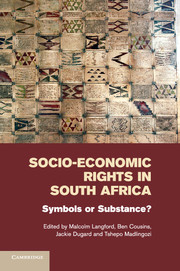‘South Africa long has been an inspiration to the world for its struggle against apartheid, peaceful transition to a multiracial democracy, and new constitution with a comprehensive declaration of rights … Many have waited eagerly to see how the promise would be realized. [This book] offers the most illuminating answers to date. With great theoretical sophistication and unparalleled empirical data, it charts the complex ways in which rights and social movements are mutually constitutive in the engagement with such diverse issues as land, health care, the delivery of water, sanitation and electricity, the environment, access to information, gender, and immigration. Everyone interested in understanding how struggles for socio-economic rights differ from the more familiar earlier contests over legal and political rights must read this book.’
Richard Abel - Connell Distinguished Professor of Law Emeritus, University of California, Los Angeles, and author of Politics by Other Means: Law in the Struggle against Apartheid, 1980–94
‘This volume makes an extraordinary contribution to the increasingly sophisticated literature on socio-economic rights globally. Rooted in a deeply contextual approach to the conditions under which civil society engages the ideas, laws and institutions through which socio-economic resources are struggled for and produced, [it] offers important insights into the complexity of understanding and achieving these rights. The different contributions offer … insights into a vast range of different socio-economic resources … yet the volume successfully roots these various resource struggles in the political economy of post-apartheid South Africa. At the same time [it] highlights a range of theoretical questions … Langford, Cousins, Dugard and Madlingozi must be congratulated on bringing together such a rich range of contributions that transform and deepen our understanding of socio-economic rights in South Africa and beyond.’
Heinz Klug - Evjue-Bascom Professor of Law, University of Wisconsin Law School
‘Dugard, Cousins, Langford, and Madlingozi - clear voices that understand the power and limitation of rights language - have edited a pioneering work that should both inspire and chastise the South African human rights movement. They insightfully show a state and civil society seduced by the medium of economic and social rights, and how rights-based strategies can be dynamic, but also vulnerable to capture by the status quo. One cannot but conclude that the South African laboratory proves that the rights discourse is not a path for total liberation from human privation.’
Makau Mutua - SUNY Distinguished Professor and Floyd H. and Hilda L. Hurst Faculty Scholar, State University of New York



